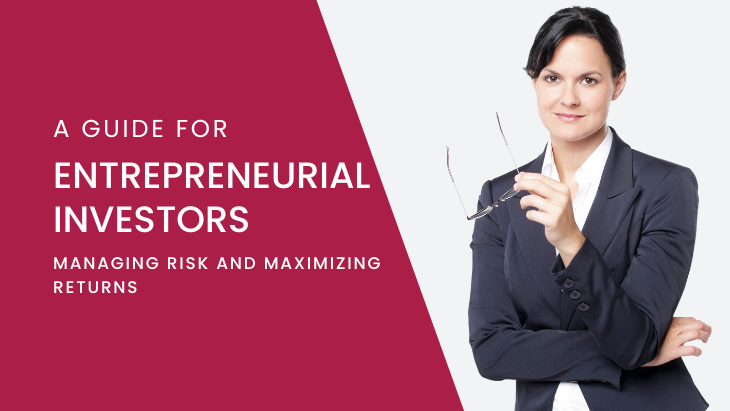As an entrepreneur, managing risk and maximizing returns are essential for the success and stability of your business. Investing your money wisely can help to grow your wealth and provide financial security, but it is important to carefully consider the risks and potential rewards of any investment before making a decision. In this guide, we will explore ten strategies that can help you manage risk and maximize returns as an entrepreneurial investor. From diversifying your investments across different asset classes to practicing good financial management, these tips can provide a solid foundation for building a successful and sustainable investment portfolio.
The Benefits of Investing Across Different Asset Classes
Diversifying your investments across different asset classes can help to reduce the overall risk of your portfolio, as different asset classes tend to perform differently in different market conditions. For example, if the stock market is experiencing a downturn, the value of your real estate investments may remain stable or even increase. By investing in a variety of asset classes, you can potentially increase your returns by taking advantage of the unique characteristics and performance patterns of each. However, it is important to remember that diversification does not guarantee a profit or protect against loss, and it is always important to carefully consider the risks and potential rewards of any investment before making a decision.
The power of Hedging
Hedging is a risk management strategy that involves taking positions in financial instruments to reduce the potential impact of adverse price movements on your investments. For example, if you are concerned that the price of a particular stock may decline, you could use a futures contract or an option to hedge against that potential loss. This can help to protect your portfolio against unexpected market volatility or other negative events. However, it is important to note that hedging can also involve significant costs and risks, and it is not a suitable strategy for everyone. It is always important to carefully consider the potential benefits and drawbacks of hedging before making a decision.
Riding the Waves of the Global Economy
Geographic diversification involves investing in different countries and regions around the world, rather than focusing solely on a single country or region. This can help to reduce the overall risk of your portfolio, as the economies and markets of different countries and regions can have different performance patterns and react differently to global events. For example, if the economy of one country is experiencing a downturn, the economy of another country may be growing, which can help to balance out the negative impact on your investments. However, it is important to remember that geographic diversification does not guarantee a profit or protect against loss, and it is always important to carefully consider the risks and potential rewards of any investment before making a decision.
Doing Well by Doing Good
Socially responsible investing (SRI) or impact investing involves investing in companies, organizations, and projects that align with your personal values and have a positive impact on society and the environment. This can include investing in companies that are committed to sustainability, diversity, and social justice, or in projects that have specific social or environmental goals. SRI and impact investing can provide both financial returns and the satisfaction of knowing that your money is being used for good. Additionally, many studies have shown that SRI and impact investing can be financially rewarding, as more and more consumers and investors are demanding socially and environmentally responsible products and services.
The Smartest Investment You Can Make
Investing in yourself, by continuing to learn and develop your skills and knowledge, can have numerous benefits for your career and financial well-being. By staying up to date with the latest developments in your field and learning new skills, you can increase your value to potential employers and increase your earning potential. Additionally, investing in your education and personal development can open up new career opportunities and broaden your horizons. This can be as simple as taking an online course, attending a seminar or conference, or pursuing a higher degree, depending on your interests and goals. By investing in yourself, you can set yourself up for long-term success and financial stability.
The Power of Perspective
As an entrepreneur, it can be beneficial to surround yourself with a diverse team of advisors who can provide different perspectives and expertise. This can include financial professionals, such as financial planners and investment advisors, who can help you make informed decisions about your finances and investments. It can also include attorneys and accountants, who can provide legal and tax advice to help you navigate the complex world of entrepreneurship. By building a diverse team of advisors, you can gain access to a range of expertise and perspectives that can help you make smart decisions and achieve your goals. Additionally, having a supportive network of advisors can provide valuable support and guidance as you navigate the challenges of entrepreneurship.
The Power of Multiple Streams of Income
Having multiple streams of income can provide financial stability and security, as it can reduce your reliance on any one source of income. This can include pursuing multiple ventures or businesses, or generating income from multiple sources, such as investments, rental properties, or consulting work. By diversifying your income streams, you can potentially increase your overall income and protect yourself against potential disruptions or setbacks in any one particular area. Additionally, having multiple streams of income can provide flexibility and freedom, as it can give you the option to pursue different opportunities and adapt to changing circumstances. However, it is important to carefully manage your time and resources, as pursuing multiple ventures or sources of income can be demanding and require careful planning.
Building Your Financial Safety Net
An emergency fund is a savings account that is specifically set aside for unexpected expenses or income disruptions. It is important to have an emergency fund, as it can provide a financial cushion in case of unforeseen events, such as a medical emergency, a natural disaster, or a sudden loss of income. Having an emergency fund can help to protect you against financial stress and instability, and can provide the resources you need to deal with unexpected expenses or income disruptions. It is generally recommended to have enough money in your emergency fund to cover at least three to six months of essential expenses, such as housing, food, and medical bills. This can provide a significant level of protection and peace of mind.
Safeguarding Your Health, Your Life, and Your Income
Insurance is a risk management tool that can help to protect you and your family against potential financial losses. This can include health insurance, which can cover the cost of medical care and treatment in case of illness or injury. It can also include life insurance, which can provide financial support to your loved ones in case of your death. And it can include disability insurance, which can provide income replacement in case of a disabling injury or illness. Having insurance can provide peace of mind and financial security, as it can help to protect you against unexpected expenses and income disruptions. It is important to carefully research and compare different insurance options, and to choose a policy that meets your needs and budget.
The Keys to Effective Financial Management
Good financial management is essential for the success and stability of any business, and there are several key practices that can help to ensure that your finances are on track. This can include creating a budget, which can help you to plan and prioritize your spending, and identify areas where you can save money. It can also include reducing expenses, by cutting unnecessary costs and finding more cost-effective ways to operate your business. And it can include monitoring your cash flow, to ensure that you have sufficient funds to meet your financial obligations and to take advantage of opportunities as they arise. By practicing good financial management, you can increase the efficiency and sustainability of your business, and set yourself up for long-term success.







